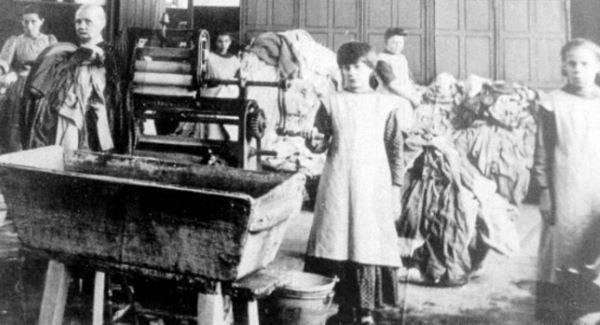|
Government ‘conscious of redress’ for Magdalene survivors
By Conall ó Fátharta
[with pdf] The Government was “conscious of the danger” of offering redress for Magdalene survivors just months before setting up the McAleese inquiry to investigate the issue. The admission is made in a March 2011 Department of Justice draft memorandum for the Government, seeking permission to establish an inter-departmental committee to review a November 2010 Irish Human Rights Commission (IHRC) report on the Magdalene laundries. Released under the Freedom of Information Act, it states that the then justice minister, Alan Shatter, was “conscious of the danger” of redress and of Finance Minister Michael Noonan’s view that proposals raised in an earlier memo “would very likely generate pressure for opening redress”. Mr Shatter felt an inter-departmental committee, which he proposed be headed by his department, would “strengthen the position of the Government in dealing with the ongoing campaign”. The committee to establish the facts of State involvement with the Magdalene laundries was formally established some three months later — headed by Martin McAleese. The Department of Justice memo states categorically that, despite “various ‘documentaries’ and the report of the Irish Human Rights Commission”, the State had no case to answer in respect of the Magdalene Laundries. It says government departments were concerned that “engaging with the religious orders might give the impression that the State was accepting responsibility in this area”. “The department is not aware of any facts that would give rise to State liability or responsibility for abuses in Magdalene Laundries... If there were any abuses in Magdalene Laundries, the individual abusers concerned and the religious orders who ran them are responsible.” The memo also details Mr Shatter’s scathing opinion of the IHRC report on the laundries. It states the then justice minister had “serious reservations about the methodology, accuracy, and conclusions”. “Of most concern is the lack of balance and any evidence to support the conclusions. The IHRC report is effectively based on allegations put forward by JFM (Justice for Magdalenes) and no effort was made to obtain clarification, information or observations from the State or (apparently) the religious orders on any of the issues raised.” When in opposition, Mr Shatter stated there was “irrefutable evidence” within the Department of Justice that the State was “directly complicit” in “barbaric cruelty” that occurred in the Magdalene laundries. Claire McGettrick of Justice For Magdalenes Research said that the memo highlighted the “cynical approach” taken by the Government when dealing with the Magdalene issue and expressed concern the upcoming mother and baby homes inquiry would be treated in the same manner. “The Government must include the Magdalene laundries in the upcoming Commission of Investigation. The contents of this Government memorandum illustrate that openness and transparency are absolutely imperative in the investigation as the Government’s position is likely to be one of defensiveness rather than a desire to genuinely facilitate a truth-telling process,” she said. Laundries not ruled out of baby home inquiry Magdalene Laundries and county homes have not been ruled out of the upcoming inquiry into mother-and-baby homes. In a meeting with representatives from Justice for Magdalenes Research (JFMR) and the Adoption Rights Alliance (ARA), Dr James Reilly, the children’s minister, said no decision had been made on the inclusion of the institutions but he was determined to have as inclusive an inquiry as possible. It is understood the JFMR delegation repeated its concerns about the quality of the McAleese report. The group also outlined evidence that women conceived in Magdalene Laundries before being sent to mother-and-baby homes to have their child. These women were then returned to the laundry and the child adopted. Both groups stressed the need for the inquiry to examine forced and illegal adoptions and include institutions like St Patrick’s Guild adoption agency and St Patrick’s Infant Hospital, Temple Hill in Dublin, which were not specifically mother-and-baby homes but arranged adoptions. Dr Reilly is understood to have confirmed that the inquiry would have the power to compel religious orders to hand over relevant files and records, as well as the power to order witnesses to attend. Last week, Dr Reilly caused concern among adoption campaigners by stating that his overriding concern was that the inquiry might be flawed if the terms of reference were too wide. He also said the commission could not be viewed as a vehicle to inquire into all matters where there was a deficit in the treatment of people. The co-founder of ARA, Claire McGettrick, described the meeting as “productive” but stressed that any inquiry which ignored the wider issues of illegal and forced adoptions and which did not include all of the institutions involved in such practices was “destined for failure”. “If the proposed Commission of Investigation merely looks at a selected list of institutions to the exclusion of others, and if it does so in isolation from the wider issues like the State’s involvement in forced and illegal adoptions and of how women in crisis pregnancy and their children have been treated, then this inquiry is destined for failure before it ever commences,” she said. Ms McGettrick said for the inquiry to enjoy the confidence of the adoption community, the terms of reference need to be as broad as necessary. “If not, these issues are guaranteed to arise again and the court of history will not look kindly on a government that chose to ignore those who have called for a genuine truth-finding investigation,” said Ms McGettrick.
|
.
Any original material on these pages is copyright © BishopAccountability.org 2004. Reproduce freely with attribution.
